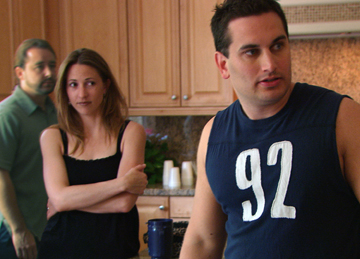 James Hergott (92) builds a house of cards in ‘All That I Need.’
James Hergott (92) builds a house of cards in ‘All That I Need.’
|
| All That I Need\r\nStarring James Hergott and Audra J. Morgan. Written and directed by James Hergott. Rated R. |
|
A D V E R T I S E M E N T
|
|
|
|
A D V E R T I S E M E N T
|
|
The $80,000 Pyramid
With his movie in limited release, one filmmaker\r\ntalks business.
By KRISTIAN LIN
James Hergott first conceived the idea for his filmmaking debut All That I Need when he was 21. Working minimum-wage jobs in Ontario, he was invited to a meeting in the suburbs attended mostly by women. Not knowing anything about pyramid schemes, he was intrigued by the group’s plan to increase their investors’ money eightfold just by recruiting a few new members. As the scheme gathered momentum, events quickly spiraled out of control. “A friend of mine had his car set on fire because he didn’t pay,” he recalled. “These were soccer moms, and they were suddenly acting like gangsters. It was a story that had all the elements of a Shakespearean tragedy, and it was an interesting commentary on how money changes people.”
All That I Need opens in a few selected cities this week, Fort Worth among them. To get his first filmmaking effort in theaters, Hergott bypassed the major indie-film distributors by creating a distribution arm for his production company and cutting a deal with the Regal Entertainment chain, a company that owns United Artists theaters nationwide.
The film takes place at a series of meetings in Newport Beach, Calif., run by a guy named James (played by Hergott himself) outlining his plan for investors who contribute $10,000 apiece with the promise of eventually receiving $80,000 back when they bring in eight new members. From an initial meeting with roughly a dozen people at someone’s house, the club soon swells to several hundred people partying on a yacht. But like all Ponzi schemes, it comes crashing down.
Inviting comparisons to The Blair Witch Project, the movie is shot in documentary style on high-definition video, with characters reacting to the presence of the camera and the film crew. Hergott chose the style for its immediacy. “This [subject] isn’t outside the realm of possibility for people,” he said. “I wanted it to feel like you were really there.”
Also influencing the decision was the fact that shooting this way was cheaper. After writing out a script, Hergott then trashed it on the set, and instead gave each actor his or her motivation separately and encouraged them to improvise. Starring in the film as well as directing wasn’t that difficult for the filmmaker. “The way [the movie] is set up, my character is the story’s driving force, so I was leading people behind the camera and in front,” he said, adding sheepishly, “It was easy for the actors to take out their aggression on me.”
He admitted to encountering a lot of aggression after filming a climactic scene in which his character and several others are arrested by the police during a party. Hergott told only five of his fellow actors — the ones who were actually being handcuffed — what would happen, so the looks of distress on the faces of the other partygoers are genuine. “It’s fine now, but a lot of people were upset with me at the time.”
His film runs a scant 80 minutes and works quite well for about half that time, mostly in the scenes that are about the Ponzi scheme. It’s helped by the solidly built Hergott’s own wonkish fluidity in front of the camera — he’s persuasive enough in a non-sleazy way that you can understand why other people might trust him with their money. The movie fails seriously, though, in adding in a romance between his character and Rae-lyn (Audra J. Morgan), an investor who runs her own internet porn site. It’s not just that this subplot lends itself less easily to the cinema-vérité technique, but the character motivation here is sketchy, and there’s little chemistry between the two leads.
Hergott, who studied film at York University in his native Canada, had no regrets about his preference for commercial cinema rather than experimental fare. “I didn’t really fit in [at film school],” he said. “Most of the film students weren’t practical. I wanted to be in the industry.”
He’s still deep into promoting his film; this past summer he was at Cannes hawking the movie by passing out free condoms, an idea suggested by one of the cast members. His next planned project is called Brothers, scheduled to start filming in a few months, about a gay teen with a crush on his older brother’s football teammate.
He gave much credit to his mentor and collaborator Tarquin Gotch for teaching him about the importance of story structure and writing, as well as about the business aspects of filmmaking. Hergott recommended that aspiring filmmakers learn how to write a business plan. “You should know where you’re headed,” he said. “Who’s going to pay to see your movie? Investors want to know how they’re going to get their money back. A lot of people have an idea for a movie, but unless you can show that someone will pay to see it, no one will give you the funding.”
 Email this Article...
Email this Article...

